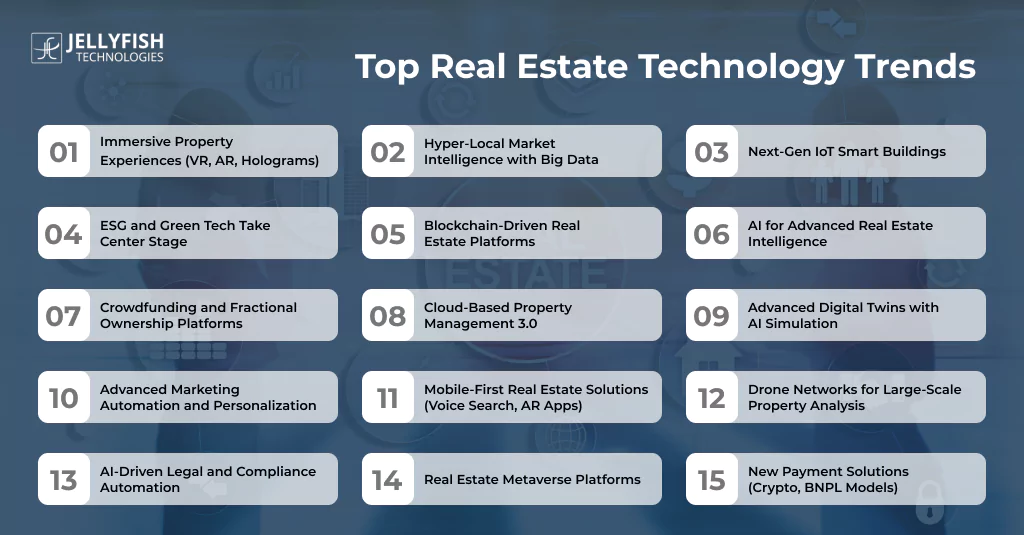
Picture yourself touring your dream home from your couch. A virtual tour lets you explore every room, imagining your life in vivid detail.
This is the future of real estate. Technology is changing how we buy, sell, and manage properties. The impact of technology on real estate is creating a digital revolution. Proptech trends are driving smarter, faster ways to handle deals, and companies adopting real estate tech trends are leading the charge.
Technologies like blockchain, IoT, AI, and augmented reality (AR) are creating tools like smart contracts and virtual tours. These tools make the process more exciting and efficient.

Today’s buyers, especially Gen Z, want quick, tech-savvy solutions. They’re different from past generations, expecting seamless, digital-first experiences. This shift has sparked proptech, a blend of "property" and "technology," which is transforming the industry.
Real estate technology platforms combine online convenience with in-person visits. For example, you can take a virtual tour of a home and then visit it with digital tools to visualize changes. Governments are helping this change by allowing e-signatures and digital land records. They are also boosting real estate technology.
This digital shift isn’t just about ease—it meets the needs of modern buyers. They want new technology that makes buying a home faster and more engaging. From commercial real estate technology trends to home sales, real estate innovation is changing the game.
Tech-driven innovation trends are making every step easier, from finding a property to managing it. Forget piles of paperwork or slow processes. Real estate technology tools are making things smoother. Here are the best technology trends shaping the future:
Artificial intelligence (AI) and machine learning are powerful tools for technology for real estate agents. They use predictive analytics to estimate home values, helping you make smart choices. For example, AI can study market data to spot trends in real estate investing, giving investors an advantage.
Real estate tech tools like AI chatbots answer questions and schedule tours any time, day or night. They also handle tasks like paperwork, cutting down mistakes and saving time. These are key property management technology trends, making AI some of the best technology for real estate agents.
Imagine a real estate agent using AI to suggest homes that match your budget and style, all instantly. This personal touch makes buying easier and is a crucial component of real estate investment technology.
New real estate technology like virtual reality (VR) and augmented reality (AR) is changing how you see properties. VR home tours let you walk through a home from anywhere, checking out details like the view or space. Virtual staging shows how your furniture might look in a home. AR overlays make in-person visits fun by adding digital features, like showing how a renovated kitchen could look.
These tools are especially useful in commercial real estate technology trends, where expansive spaces need clear visuals. By mixing digital and real-world experiences, real estate technology trends make buying more exciting and easy for everyone.
Blockchain makes real estate investment technology more open and safe. With smart contracts, parties record deals digitally, so no one can change or fake them. This cuts out middlemen, like title companies, saving money and speeding things up. It’s a big win for it and real estate.
For example, buying a home with a smart contract means the system checks who owns it. It also moves money automatically when everything is ready. This reduces errors and paperwork, making blockchain one of the top emerging technologies in real estate.
The Internet of Things (IoT) turns homes and offices into smart buildings. Devices like smart thermostats track energy use, saving money on bills.
Real estate technology uses IoT to send alerts for maintenance. This warns managers about issues, like a leaky pipe, before they become a problem. This keeps properties in great shape and makes tenants happier.
For instance, a smart building might tell a manager when an air conditioner needs a check-up, avoiding breakdowns. This focus on smart systems is a key part of property management trends. It helps shape the future of real estate technology.

The innovation in the real estate industry brings substantial benefits for everyone involved:
These changes make the industry quicker, clearer, and friendlier for customers. They show why real estate and technology fit well together.
The future of real estate technology is exciting, but there are hurdles:
Tackling these challenges takes work, but the rewards of real estate technology solutions are worth it.
Beyond buying and selling, property management technology trends are changing how properties are cared for. Tools like IoT sensors and AI analytics help managers keep buildings in top shape. For example, AI can predict when a heating system might fail, letting managers fix it early. These real estate technology tools save money and keep tenants happy by preventing problems.
Corporate real estate technology is also advancing fast. Smart office buildings and virtual tours make it easier for businesses to find spaces. For example, a company can use a VR tour to check out multiple offices in one day, saving time. These commercial real estate technology trends are key in fast-moving markets where efficiency matters.
Trends in real estate investing are evolving with technology. AI platforms analyze markets to find the best properties to invest in. Blockchain allows fractional ownership, letting smaller investors buy a piece of a property. These real estate investment technology tools make investing more open and profitable for everyone.
The future of real estate technology is full of promise. Real estate and technology are coming together to create a smoother, more open, and customer-focused industry. AI, machine learning, blockchain, and IoT are changing proptech.
These trends create a tech-driven world. They connect buyers, sellers, and managers in new ways. Companies that embrace real estate technology solutions will lead the industry, making deals faster and experiences better.
Whether you’re a realtor, investor, or property manager, tech-driven innovation trends in real estate are a must. This streamlines work, delights customers, and keeps you ahead in a crowded market. The digital revolution is here, and those who embrace will shape the future of the industry.

.svg)